– whereas the often scolded cholesterol is good for you
 Cardiovascular diseases account for more deaths than anything else. Still, there is a lot of discussion about the diet and its impact on cardiovascular health, typically when it comes to the question of avoiding fat and choosing margarine instead of butter. A team of Czech scientists decided to study diet habits among different populations and compare these with the risk of cardiovascular disease and premature death. Their study shows that there is no need to be afraid of cholesterol. In fact, the official dietary guidelines could easily do with an adjustment. At the same time, it is important to reduce our intake of carbohydrates and omega-6 fatty acids that are the real culprits. Finally, it is essential to increase the intake of omega-3.
Cardiovascular diseases account for more deaths than anything else. Still, there is a lot of discussion about the diet and its impact on cardiovascular health, typically when it comes to the question of avoiding fat and choosing margarine instead of butter. A team of Czech scientists decided to study diet habits among different populations and compare these with the risk of cardiovascular disease and premature death. Their study shows that there is no need to be afraid of cholesterol. In fact, the official dietary guidelines could easily do with an adjustment. At the same time, it is important to reduce our intake of carbohydrates and omega-6 fatty acids that are the real culprits. Finally, it is essential to increase the intake of omega-3.
 Inflammation appears to be a key factor in the majority of chronic illnesses such as e.g. rheumatism, type-2 diabetes, and cancer. Science has primarily focused on EPA (eicosapentaenoic acid), but new research points to supplementation with DHA (docosahexaenoic acid) as being even more effective in healthy patients with too much abdominal fat and subclinical systemic inflammation.
Inflammation appears to be a key factor in the majority of chronic illnesses such as e.g. rheumatism, type-2 diabetes, and cancer. Science has primarily focused on EPA (eicosapentaenoic acid), but new research points to supplementation with DHA (docosahexaenoic acid) as being even more effective in healthy patients with too much abdominal fat and subclinical systemic inflammation.
- because of the many antioxidants
 A new Chinese study that is published in the science journal, Heart, shows that eating an egg every day can lower your risk of stroke by 26 percent. The reason is that eggs contain selenium and other powerful antioxidants that protect against atherosclerosis, and we do not get all that much selenium from our diets. Therefore, forget all about the cholesterol scare and warnings against eating eggs. That dietary advice is outdated and has done more harm than good.
A new Chinese study that is published in the science journal, Heart, shows that eating an egg every day can lower your risk of stroke by 26 percent. The reason is that eggs contain selenium and other powerful antioxidants that protect against atherosclerosis, and we do not get all that much selenium from our diets. Therefore, forget all about the cholesterol scare and warnings against eating eggs. That dietary advice is outdated and has done more harm than good.
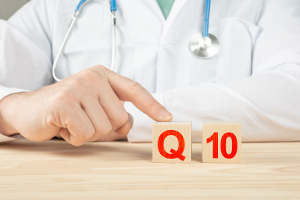 Q10 is important for cellular energy turnover, and it is also a powerful antioxidant that protects cells and the circulatory system. We synthesize most of our own coenzyme Q10. According to a new in vitro study that is published in Scientific Reports, commonly used medical drugs such as the bisphosphonates, alendronate and zoledronate, for treating osteoporosis block the body’s Q10 synthesis, thereby impairing the energy production in cells, the antioxidant defense, and other metabolic processes. Earlier research has shown that cholesterol-lowering statins lower the endogenous Q10 synthesis, causing side effects such as tiredness, aching muscles, and impotence. It may therefore be a good idea for patients on this type of medication to take a Q10 supplement to prevent or mitigate the adverse effects.
Q10 is important for cellular energy turnover, and it is also a powerful antioxidant that protects cells and the circulatory system. We synthesize most of our own coenzyme Q10. According to a new in vitro study that is published in Scientific Reports, commonly used medical drugs such as the bisphosphonates, alendronate and zoledronate, for treating osteoporosis block the body’s Q10 synthesis, thereby impairing the energy production in cells, the antioxidant defense, and other metabolic processes. Earlier research has shown that cholesterol-lowering statins lower the endogenous Q10 synthesis, causing side effects such as tiredness, aching muscles, and impotence. It may therefore be a good idea for patients on this type of medication to take a Q10 supplement to prevent or mitigate the adverse effects.
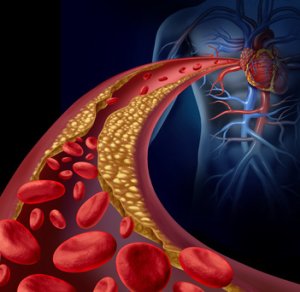 Atherosclerosis is one of the leading causes of death in the Western world, and the heart is particularly vulnerable. According to a study from the University of Birmingham, Alabama (USA), foods that are rich in potassium such as bananas, potatoes, avocado, and almonds protect against this disease, which takes years to develop. Beware that too much salt and the use of diuretics may deplete the body’s potassium stores.
Atherosclerosis is one of the leading causes of death in the Western world, and the heart is particularly vulnerable. According to a study from the University of Birmingham, Alabama (USA), foods that are rich in potassium such as bananas, potatoes, avocado, and almonds protect against this disease, which takes years to develop. Beware that too much salt and the use of diuretics may deplete the body’s potassium stores.
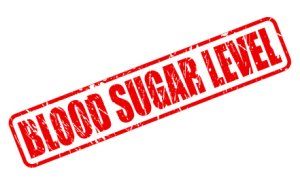 A British study has shown that elevated blood sugar levels cause blood vessels to constrict. This strains the heart, raises blood pressure, and reduces the blood supply to other organs. It is therefore sugar and not saturated fat that is the cause of cardiovascular disease. We should be far more focused on how to control our blood sugar levels. Proper diet means a lot, and so does adequate intake of a particular essential trace element that appears to have a special role.
A British study has shown that elevated blood sugar levels cause blood vessels to constrict. This strains the heart, raises blood pressure, and reduces the blood supply to other organs. It is therefore sugar and not saturated fat that is the cause of cardiovascular disease. We should be far more focused on how to control our blood sugar levels. Proper diet means a lot, and so does adequate intake of a particular essential trace element that appears to have a special role.
- and help prevent atherosclerosis
 On a global scale, atherosclerosis is the leading cause of death due to heart failure or stroke. Atherosclerosis causes symptoms such as breathing difficulty, calf pain,impotence, and poor memory as a result of organs and tissues not getting enough blood and oxygen. Because the condition develops slowly and many people are not even aware of its presence before it is too late, early prevention is vital. According to a study that is published in the science journal Circulation, four grams of fish oil daily can lower levels of triglycerides, a blood lipid that is considered to be more harmful than cholesterol. It is also important to address the indirect causes of elevated triglyceride levels such as overweight, metabolic syndrome and type 2 diabetes. Consuming too many carbohydrates may even cause fatty liver and result in excess triglyceride production. On the other hand, triglycerides also have health properties, which we will take a closer look at for clarity.
On a global scale, atherosclerosis is the leading cause of death due to heart failure or stroke. Atherosclerosis causes symptoms such as breathing difficulty, calf pain,impotence, and poor memory as a result of organs and tissues not getting enough blood and oxygen. Because the condition develops slowly and many people are not even aware of its presence before it is too late, early prevention is vital. According to a study that is published in the science journal Circulation, four grams of fish oil daily can lower levels of triglycerides, a blood lipid that is considered to be more harmful than cholesterol. It is also important to address the indirect causes of elevated triglyceride levels such as overweight, metabolic syndrome and type 2 diabetes. Consuming too many carbohydrates may even cause fatty liver and result in excess triglyceride production. On the other hand, triglycerides also have health properties, which we will take a closer look at for clarity.
 Surprisingly many people suffer from hypertension without knowing it. That is a concealed threat, as elevated blood pressure is a common cause of stroke and premature death. However, people with hypertension who take folic acid along with their blood pressure-lowering medicine have a substantially lower risk of stroke.
Surprisingly many people suffer from hypertension without knowing it. That is a concealed threat, as elevated blood pressure is a common cause of stroke and premature death. However, people with hypertension who take folic acid along with their blood pressure-lowering medicine have a substantially lower risk of stroke.
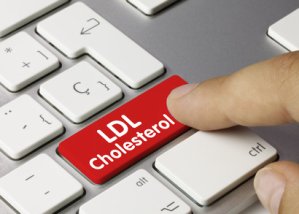 Medical science has claimed for decades that elevated cholesterol levels pose a health threat, especially if you have too much of the so-called “bad” cholesterol – or LDL (Low-Density Lipoprotein). However, a team of international experts is now arguing that this theory is exaggerated. In fact, the experts specifically advise against taking cholesterol-lowering statins. Meanwhile, science is focused on how to improve the safety of statins by combining them with supplements of coenzyme Q10.
Medical science has claimed for decades that elevated cholesterol levels pose a health threat, especially if you have too much of the so-called “bad” cholesterol – or LDL (Low-Density Lipoprotein). However, a team of international experts is now arguing that this theory is exaggerated. In fact, the experts specifically advise against taking cholesterol-lowering statins. Meanwhile, science is focused on how to improve the safety of statins by combining them with supplements of coenzyme Q10.
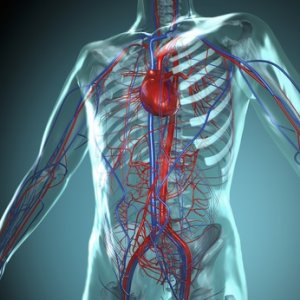 There is absolutely no reason not to consume eggs, meat, butter and other cholesterol-filled foods with a good conscience. American dietary guidelines have finally exonerated cholesterol, which happens to be an essential compound. Many scientists actually claim that atherosclerosis and cardiovascular disease are both a result of inflammation and lack of specific micronutrients. It is important to pay attention to factors that are known to promote inflammation in the body and take the necessary steps by looking after your circulatory system, making healthy lifestyle choices, and possibly even using supplements.
There is absolutely no reason not to consume eggs, meat, butter and other cholesterol-filled foods with a good conscience. American dietary guidelines have finally exonerated cholesterol, which happens to be an essential compound. Many scientists actually claim that atherosclerosis and cardiovascular disease are both a result of inflammation and lack of specific micronutrients. It is important to pay attention to factors that are known to promote inflammation in the body and take the necessary steps by looking after your circulatory system, making healthy lifestyle choices, and possibly even using supplements.
 Eat plenty of oily fish from clean oceans or take a fish oil supplement to make sure that you get enough of the essential omega-3 fatty acids. It lowers your risk of premature death by protecting you against atherosclerosis and a number of other diseases. In fact, blood levels of omega-3 tell a lot more than levels of cholesterol, according to a new study that is published in Journal of Clinical Lipidology.
Eat plenty of oily fish from clean oceans or take a fish oil supplement to make sure that you get enough of the essential omega-3 fatty acids. It lowers your risk of premature death by protecting you against atherosclerosis and a number of other diseases. In fact, blood levels of omega-3 tell a lot more than levels of cholesterol, according to a new study that is published in Journal of Clinical Lipidology.
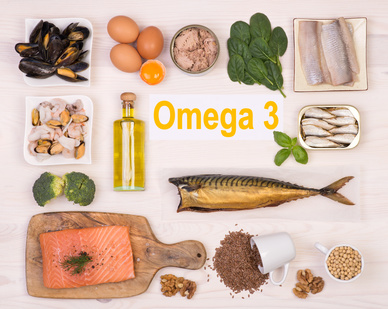 It pays off to make sure to get enough omega-3 from your diet or by taking supplements. Studies show that the content of omega-3 fatty acids in the blood are linked directly to a lower risk of developing atherosclerosis and dying of a heart attack. This was ween in a large epidemiological study that is published in the journal JAMA Internal Medicine.
It pays off to make sure to get enough omega-3 from your diet or by taking supplements. Studies show that the content of omega-3 fatty acids in the blood are linked directly to a lower risk of developing atherosclerosis and dying of a heart attack. This was ween in a large epidemiological study that is published in the journal JAMA Internal Medicine.
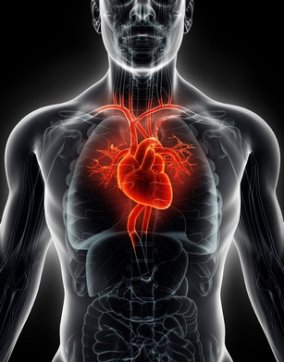 Many people suffer from chronic heart failure - often without knowing it. Numerous studies have shown that supplementing with Q10 can improve quality of life and even reduce mortality. An article published in Pharmacologic Therapy reviews the many Q10 studies and makes a point of saying that it is important to choose a Q10 preparation with good bioavailability.
Many people suffer from chronic heart failure - often without knowing it. Numerous studies have shown that supplementing with Q10 can improve quality of life and even reduce mortality. An article published in Pharmacologic Therapy reviews the many Q10 studies and makes a point of saying that it is important to choose a Q10 preparation with good bioavailability.
The way in w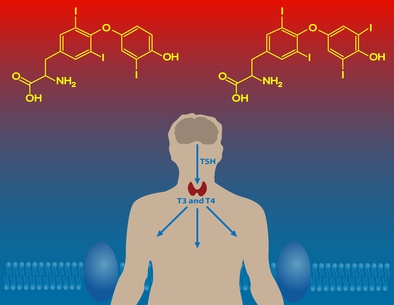 hich selenium and iodine interact is determining for the thyroid gland and the metabolism. A deficiency of one or both nutrients coupled with exposure to environmental toxins may have grave consequences and contribute to some of the most commonly occurring metabolic disorders.
hich selenium and iodine interact is determining for the thyroid gland and the metabolism. A deficiency of one or both nutrients coupled with exposure to environmental toxins may have grave consequences and contribute to some of the most commonly occurring metabolic disorders.
You may want to consider taking a Q10 supplement
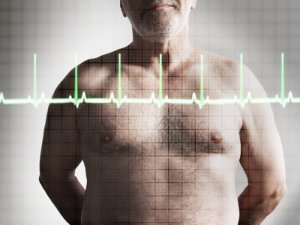 Statins do more than lower your cholesterol. They have an array of side effects but you can effectively counteract them by taking coenzyme Q10 together with your drug.
Statins do more than lower your cholesterol. They have an array of side effects but you can effectively counteract them by taking coenzyme Q10 together with your drug.
Has your physician told you to take cholesterol-lowering statins? Well, it has to be said that these drugs are highly effective for lowering cholesterol. What you may not know, however, is that statins also lower levels of coenzyme Q10, a vital substance which all your cells need to produce energy. Coenzyme Q10 and cholesterol are synthesized in the liver and share the same biochemical pathway, and statins work by blocking this pathway. When levels of coenzyme Q10 go down, you risk a number of side effects that occur when the body's cells suddenly produce too little energy to function normally.
- and you also need magnesium for your bones
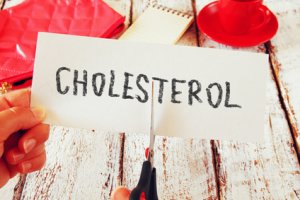 It has been discussed whether it is calcium or vitamin D that improves women’s cholesterol balance. Earlier studies of women who use combined supplements have not been able to determine whether the positive effect is due to calcium or vitamin D. However, a study from Women’s Health Initiative (WHI) reveals that the effect is down to vitamin D. If you want strong bones and a healthy cardiovascular system, it is a good idea to combine both calcium and vitamin D with magnesium.
It has been discussed whether it is calcium or vitamin D that improves women’s cholesterol balance. Earlier studies of women who use combined supplements have not been able to determine whether the positive effect is due to calcium or vitamin D. However, a study from Women’s Health Initiative (WHI) reveals that the effect is down to vitamin D. If you want strong bones and a healthy cardiovascular system, it is a good idea to combine both calcium and vitamin D with magnesium.
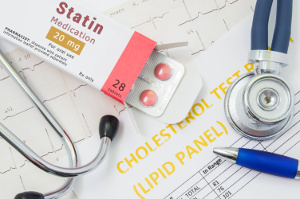 Cholesterol-lowering statins are among some of the most widely sold medical drugs. However, there is growing disagreement about their preventive effect on atherosclerosis and cardiovascular diseases, which are linked to many other factors than cholesterol levels alone. It turns out that statins also block the body’s production of vitamin K2, a nutrient that contributes to removing calcium from the bloodstream. A new study that is published in Medical Sciences concludes that atherosclerosis is more prevalent among statin users than among non-users, regardless of any cardiovascular diseases that have already been diagnosed. In other words, statins actually increase your risk of clogged-up arteries and that contradicts the traditional view. The new study supports earlier research, and it has been known for years that statins also block the endogenous synthesis of coenzyme Q10 and vitamin D, both of which are important for the heart and circulatory system.
Cholesterol-lowering statins are among some of the most widely sold medical drugs. However, there is growing disagreement about their preventive effect on atherosclerosis and cardiovascular diseases, which are linked to many other factors than cholesterol levels alone. It turns out that statins also block the body’s production of vitamin K2, a nutrient that contributes to removing calcium from the bloodstream. A new study that is published in Medical Sciences concludes that atherosclerosis is more prevalent among statin users than among non-users, regardless of any cardiovascular diseases that have already been diagnosed. In other words, statins actually increase your risk of clogged-up arteries and that contradicts the traditional view. The new study supports earlier research, and it has been known for years that statins also block the endogenous synthesis of coenzyme Q10 and vitamin D, both of which are important for the heart and circulatory system.
 Cardiovascular diseases account for more deaths than anything else. Still, there is a lot of discussion about the diet and its impact on cardiovascular health, typically when it comes to the question of avoiding fat and choosing margarine instead of butter. A team of Czech scientists decided to study diet habits among different populations and compare these with the risk of cardiovascular disease and premature death. Their study shows that there is no need to be afraid of cholesterol. In fact, the official dietary guidelines could easily do with an adjustment. At the same time, it is important to reduce our intake of carbohydrates and omega-6 fatty acids that are the real culprits. Finally, it is essential to increase the intake of omega-3.
Cardiovascular diseases account for more deaths than anything else. Still, there is a lot of discussion about the diet and its impact on cardiovascular health, typically when it comes to the question of avoiding fat and choosing margarine instead of butter. A team of Czech scientists decided to study diet habits among different populations and compare these with the risk of cardiovascular disease and premature death. Their study shows that there is no need to be afraid of cholesterol. In fact, the official dietary guidelines could easily do with an adjustment. At the same time, it is important to reduce our intake of carbohydrates and omega-6 fatty acids that are the real culprits. Finally, it is essential to increase the intake of omega-3.







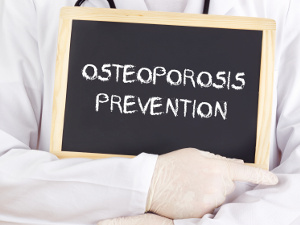 Vitamin D is important for cellular calcium uptake, bone health, and a number of other functions. There is also a direct link between the widespread vitamin D deficiency problem and brittle bones and osteoporosis among post-menopausal women, according to a large Chinese study that is published in Frontiers in Nutrition. It is important to include magnesium and vitamin K2, as they also contribute to bone health.
Vitamin D is important for cellular calcium uptake, bone health, and a number of other functions. There is also a direct link between the widespread vitamin D deficiency problem and brittle bones and osteoporosis among post-menopausal women, according to a large Chinese study that is published in Frontiers in Nutrition. It is important to include magnesium and vitamin K2, as they also contribute to bone health.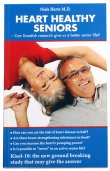

 Inflammation appears to be a key factor in the majority of chronic illnesses such as e.g. rheumatism, type-2 diabetes, and cancer. Science has primarily focused on EPA (eicosapentaenoic acid), but new research points to supplementation with DHA (docosahexaenoic acid) as being even more effective in healthy patients with too much abdominal fat and subclinical systemic inflammation.
Inflammation appears to be a key factor in the majority of chronic illnesses such as e.g. rheumatism, type-2 diabetes, and cancer. Science has primarily focused on EPA (eicosapentaenoic acid), but new research points to supplementation with DHA (docosahexaenoic acid) as being even more effective in healthy patients with too much abdominal fat and subclinical systemic inflammation.

 Atherosclerosis is one of the leading causes of death in the Western world, and the heart is particularly vulnerable. According to a study from the University of Birmingham, Alabama (USA), foods that are rich in potassium such as bananas, potatoes, avocado, and almonds protect against this disease, which takes years to develop. Beware that too much salt and the use of diuretics may deplete the body’s potassium stores.
Atherosclerosis is one of the leading causes of death in the Western world, and the heart is particularly vulnerable. According to a study from the University of Birmingham, Alabama (USA), foods that are rich in potassium such as bananas, potatoes, avocado, and almonds protect against this disease, which takes years to develop. Beware that too much salt and the use of diuretics may deplete the body’s potassium stores. A British study has shown that elevated blood sugar levels cause blood vessels to constrict. This strains the heart, raises blood pressure, and reduces the blood supply to other organs. It is therefore sugar and not saturated fat that is the cause of cardiovascular disease. We should be far more focused on how to control our blood sugar levels. Proper diet means a lot, and so does adequate intake of a particular essential trace element that appears to have a special role.
A British study has shown that elevated blood sugar levels cause blood vessels to constrict. This strains the heart, raises blood pressure, and reduces the blood supply to other organs. It is therefore sugar and not saturated fat that is the cause of cardiovascular disease. We should be far more focused on how to control our blood sugar levels. Proper diet means a lot, and so does adequate intake of a particular essential trace element that appears to have a special role. On a global scale, atherosclerosis is the leading cause of death due to heart failure or stroke. Atherosclerosis causes symptoms such as breathing difficulty, calf pain,
On a global scale, atherosclerosis is the leading cause of death due to heart failure or stroke. Atherosclerosis causes symptoms such as breathing difficulty, calf pain, Surprisingly many people suffer from hypertension without knowing it. That is a concealed threat, as elevated blood pressure is a common cause of stroke and premature death. However, people with hypertension who take folic acid along with their blood pressure-lowering medicine have a substantially lower risk of stroke.
Surprisingly many people suffer from hypertension without knowing it. That is a concealed threat, as elevated blood pressure is a common cause of stroke and premature death. However, people with hypertension who take folic acid along with their blood pressure-lowering medicine have a substantially lower risk of stroke. Medical science has claimed for decades that elevated cholesterol levels pose a health threat, especially if you have too much of the so-called “bad” cholesterol – or LDL (Low-Density Lipoprotein). However, a team of international experts is now arguing that this theory is exaggerated. In fact, the experts specifically advise against taking cholesterol-lowering statins. Meanwhile, science is focused on how to improve the safety of statins by combining them with supplements of coenzyme Q10.
Medical science has claimed for decades that elevated cholesterol levels pose a health threat, especially if you have too much of the so-called “bad” cholesterol – or LDL (Low-Density Lipoprotein). However, a team of international experts is now arguing that this theory is exaggerated. In fact, the experts specifically advise against taking cholesterol-lowering statins. Meanwhile, science is focused on how to improve the safety of statins by combining them with supplements of coenzyme Q10. There is absolutely no reason not to consume eggs, meat, butter and other cholesterol-filled foods with a good conscience. American dietary guidelines have finally exonerated cholesterol, which happens to be an essential compound. Many scientists actually claim that atherosclerosis and cardiovascular disease are both a result of inflammation and lack of specific micronutrients. It is important to pay attention to factors that are known to promote inflammation in the body and take the necessary steps by looking after your circulatory system, making healthy lifestyle choices, and possibly even using supplements.
There is absolutely no reason not to consume eggs, meat, butter and other cholesterol-filled foods with a good conscience. American dietary guidelines have finally exonerated cholesterol, which happens to be an essential compound. Many scientists actually claim that atherosclerosis and cardiovascular disease are both a result of inflammation and lack of specific micronutrients. It is important to pay attention to factors that are known to promote inflammation in the body and take the necessary steps by looking after your circulatory system, making healthy lifestyle choices, and possibly even using supplements. Eat plenty of oily fish from clean oceans or take a fish oil supplement to make sure that you get enough of the essential omega-3 fatty acids. It lowers your risk of premature death by protecting you against atherosclerosis and a number of other diseases. In fact, blood levels of omega-3 tell a lot more than levels of cholesterol, according to a new study that is published in Journal of Clinical Lipidology.
Eat plenty of oily fish from clean oceans or take a fish oil supplement to make sure that you get enough of the essential omega-3 fatty acids. It lowers your risk of premature death by protecting you against atherosclerosis and a number of other diseases. In fact, blood levels of omega-3 tell a lot more than levels of cholesterol, according to a new study that is published in Journal of Clinical Lipidology. It pays off to make sure to get enough omega-3 from your diet or by taking supplements. Studies show that the content of omega-3 fatty acids in the blood are linked directly to a lower risk of developing atherosclerosis and dying of a heart attack. This was ween in a large epidemiological study that is published in the journal JAMA Internal Medicine.
It pays off to make sure to get enough omega-3 from your diet or by taking supplements. Studies show that the content of omega-3 fatty acids in the blood are linked directly to a lower risk of developing atherosclerosis and dying of a heart attack. This was ween in a large epidemiological study that is published in the journal JAMA Internal Medicine. Many people suffer from chronic heart failure - often without knowing it. Numerous studies have shown that supplementing with Q10 can improve quality of life and even reduce mortality. An article published in Pharmacologic Therapy reviews the many Q10 studies and makes a point of saying that it is important to choose a Q10 preparation with good bioavailability.
Many people suffer from chronic heart failure - often without knowing it. Numerous studies have shown that supplementing with Q10 can improve quality of life and even reduce mortality. An article published in Pharmacologic Therapy reviews the many Q10 studies and makes a point of saying that it is important to choose a Q10 preparation with good bioavailability. hich selenium and iodine interact is determining for the thyroid gland and the metabolism. A deficiency of one or both nutrients coupled with exposure to environmental toxins may have grave consequences and contribute to some of the most commonly occurring metabolic disorders.
hich selenium and iodine interact is determining for the thyroid gland and the metabolism. A deficiency of one or both nutrients coupled with exposure to environmental toxins may have grave consequences and contribute to some of the most commonly occurring metabolic disorders. Statins do more than lower your cholesterol. They have an array of side effects but you can effectively counteract them by taking coenzyme Q10 together with your drug.
Statins do more than lower your cholesterol. They have an array of side effects but you can effectively counteract them by taking coenzyme Q10 together with your drug. It has been discussed whether it is calcium or vitamin D that improves women’s cholesterol balance. Earlier studies of women who use combined supplements have not been able to determine whether the positive effect is due to calcium or vitamin D. However, a study from Women’s Health Initiative (WHI) reveals that the effect is down to vitamin D. If you want strong bones and a healthy cardiovascular system, it is a good idea to combine both calcium and vitamin D with magnesium.
It has been discussed whether it is calcium or vitamin D that improves women’s cholesterol balance. Earlier studies of women who use combined supplements have not been able to determine whether the positive effect is due to calcium or vitamin D. However, a study from Women’s Health Initiative (WHI) reveals that the effect is down to vitamin D. If you want strong bones and a healthy cardiovascular system, it is a good idea to combine both calcium and vitamin D with magnesium. Cholesterol-lowering statins are among some of the most widely sold medical drugs. However, there is growing disagreement about their preventive effect on atherosclerosis and cardiovascular diseases, which are linked to many other factors than cholesterol levels alone. It turns out that statins also block the body’s production of vitamin K2, a nutrient that contributes to removing calcium from the bloodstream. A new study that is published in Medical Sciences concludes that atherosclerosis is more prevalent among statin users than among non-users, regardless of any cardiovascular diseases that have already been diagnosed. In other words, statins actually increase your risk of clogged-up arteries and that contradicts the traditional view. The new study supports earlier research, and it has been known for years that statins also block the endogenous synthesis of coenzyme Q10 and vitamin D, both of which are important for the heart and circulatory system.
Cholesterol-lowering statins are among some of the most widely sold medical drugs. However, there is growing disagreement about their preventive effect on atherosclerosis and cardiovascular diseases, which are linked to many other factors than cholesterol levels alone. It turns out that statins also block the body’s production of vitamin K2, a nutrient that contributes to removing calcium from the bloodstream. A new study that is published in Medical Sciences concludes that atherosclerosis is more prevalent among statin users than among non-users, regardless of any cardiovascular diseases that have already been diagnosed. In other words, statins actually increase your risk of clogged-up arteries and that contradicts the traditional view. The new study supports earlier research, and it has been known for years that statins also block the endogenous synthesis of coenzyme Q10 and vitamin D, both of which are important for the heart and circulatory system. "After about one week of taking the Q10 supplement I could feel a huge difference," says 23-year old Alan Piccini, who has been suffering from extreme fatigue and muscle aches ever since he was a child.
"After about one week of taking the Q10 supplement I could feel a huge difference," says 23-year old Alan Piccini, who has been suffering from extreme fatigue and muscle aches ever since he was a child. “Taking capsules with co-enzyme Q10 has freed me of the severe side effects of my cholesterol lowering medicine,” Mrs Franken explains.
“Taking capsules with co-enzyme Q10 has freed me of the severe side effects of my cholesterol lowering medicine,” Mrs Franken explains.